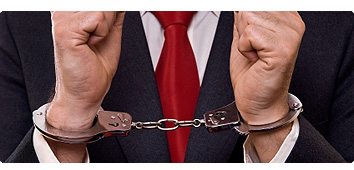
|
 |
Embezzlement is the act of dishonestly appropriating goods, usually money, by one to whom they have been entrusted. For instance, a clerk or cashier can embezzle money from his or her employer, or a civil servant can embezzle funds from the government. Embezzlement may range from the very minor, involving only small amounts, to the immense, involving large sums and sophisticated schemes.
Embezzlement differs from larceny in two ways. First, in embezzlement, an actual conversion must occur; second, the original taking must not be trespassory. To say that the taking was not trespassory is to say that originally the embezzler had the right to possess the property in question, and that he subsequently converted the property to his own use. Conversion requires that the theft seriously interfere with the property, rather than just relocate it. As in larceny, the measure is not the gain to the thief, but the loss to the true owner.
Historically, the crime of embezzlement was created by statute to deal with situations where theft could occur while the thief himself was innocent of larceny — typically because of the "lawful possession" element. That is, embezzlement fills in the blanks where larceny laws do not apply.
Distinguishing between embezzlement and larceny can be tricky. Making the distinction is particularly difficult when dealing with misappropriations of property by employees. To prove embezzlement, the state must show that the employee had possession of the goods "by virtue of her employment"; that is, that the employee had the authority to exercise substantial control over the goods. Typically, in determining whether the employee had sufficient control the courts will look at factors such as the job title, job description and the particular employment practices. For example, the manager of a shoe department at a store would likely have sufficient control over the shoes that if she converted the goods to her own use she would be guilty of embezzlement. On the other hand, if the same employee were to steal cosmetics from the cosmetic counter the crime would not be embezzlement but larceny.
|
|

|

